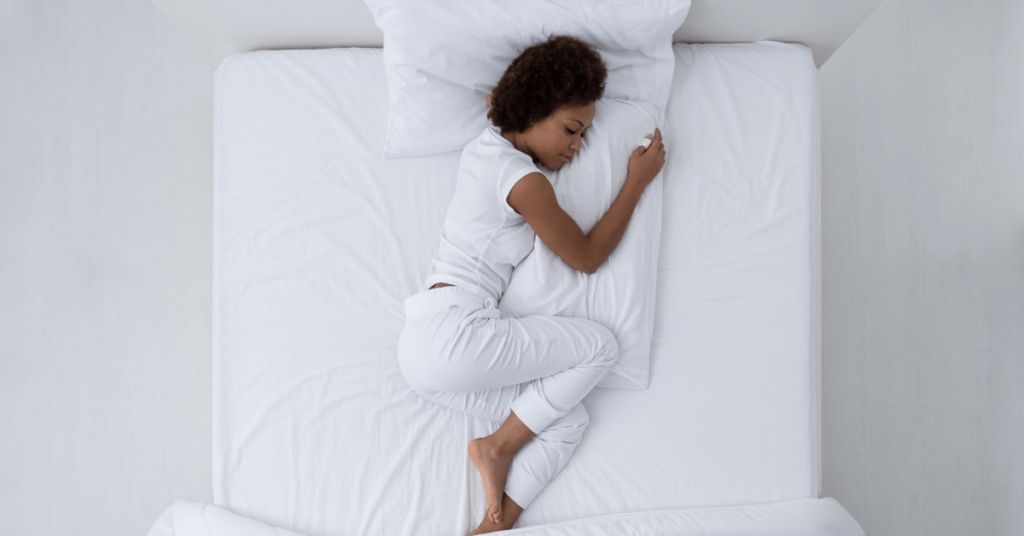In this article, the Budwig Center’s Vega and GSR (Galvanic Skin Response) Therapist, shares some vital tips and suggestions that can help you improve your sleep hygiene.
The Importance of Good “Sleep Hygiene”
We have learned so much about sleep and sleep hygiene in the past few decades, and yet, there is still so much left to discover. We all seem to be aware of the effect sleep has on our immune system and the role it plays in healing.
When I ask our patients: “How is your sleep?” I get all kinds of replies, but I have noticed that we tend to grade our sleep based on how many hours we get. With the various testing and scanning tools that we use at Budwig Center, I can pick up whether a person has a sleep disturbance or not. Many are not aware of their poor sleep quality. Usually, it becomes clear with the second question: “How do you feel when you wake up in the morning? Do you feel rested, refreshed, and alert during the day?”
What can you personally do to contribute to a better quality of sleep? Sleep that truly renews mentally, emotionally, and physically? Let’s talk about “sleep hygiene,” which refers to daily routines and habits that contribute to sleep quality.
What Factors Get in the Way of Good Sleep Hygiene?
DIET: There is a well-established link between unhealthy eating and insomnia. Interestingly, unhealthy foods – snack-type foods and alcoholic beverages – are often eaten at night, the time of day when our body needs food the least, and when food is ingested can greatly hinder our sleep.
ACTIVITIES & SURROUNDINGS: A high-stress, sedentary lifestyle, along with permanent access to work through electronic devices, does not exactly create the best circumstances for restful, quality sleep. Add to this unpleasant work, family or personal situations, conflicts, or traumatic events, and we have the perfect recipe for insomnia.
ELECTRONIC DEVICES: How many electronic devices do you have in your bedroom? How many of them are plugged in? How many of them are connected to the Internet? Why is this important? The simple answer is that EMFs affect our sleep.
LIGHT (natural & artificial): Modern living for many of us is synonymous with very little natural light during the day and plenty of artificial light at night. TV and computer screens, smartphones and tablets, and CFB (Compact Fluorescent Bulbs) and LED (Light Emitting Diode) lights are all types of artificial light that emit blue light, which mimics sunlight and contributes to alertness. As you can imagine, this is not conducive to sleep when we are exposed to it at night.
CONSISTENCY (OR LACK THEREOF): Studies show that people with irregular bedtimes have poor sleep hygiene and sleep quality. Shift work, working overtime, excess stress, lack of control of TV, video games, or online activities can all interfere with our sleep schedule and, therefore, affect the quality of our sleep.
Five Steps to Improve Your Sleep
With all these factors playing against us, is it realistic to think we can attain good sleep hygiene conducive to restorative sleep? Absolutely.
Here are a few simple and practical suggestions.
[1] Eat Right……
… and at the right time. Believe it or not, eating healthy greatly contributes to better sleep. Unhealthy, processed foods, foods that over-stimulate and provide too much sugar (sweets, high-carb foods), as well as alcohol before bedtime can reduce your chances of getting a good night’s sleep as these throw our hormones out of balance (insulin and cortisol, among others) and contribute to negative emotions, stress, and ultimately, insomnia. Beverages containing caffeine should be avoided after lunch, as caffeine’s half-life is between 5 and 6 hours.
Bear in mind that your body’s core temperature should not be too high around bedtime. Since eating spicy foods will raise your body temperature, save your favorite spicy meals for lunchtime and avoid them in the latter part of the day.
Eating at the right time is almost just as important as eating right. Why is that? The answer is closely related to the relationship between melatonin and cortisol (cortisol is often called “the stress hormone”). Our body’s cortisol level is naturally high in the morning, which contributes to a hardy appetite. A healthy person’s body receives the signal to eat when cortisol levels are high. When we eat bigger meals in the early part of the day and gradually decrease the amount of food we eat, we balance cortisol and melatonin levels in our blood. This, in turn, will contribute to a healthy sleep-wake cycle or circadian rhythm.
[2] Get Out and Move!
Get plenty of sunshine. This is vital for good sleep hygiene. The melatonin precursor serotonin is produced when we are exposed to bright light. Interestingly, our serotonin is converted to melatonin in the dark. Therefore, getting plenty of sunshine during the day will allow our body to produce healthy amounts of sleep-inducing melatonin at night.
Try going “shades-free” at least for a few minutes every day, as wearing sunglasses can inhibit receiving full sunlight.
Doing exercises during the day can also greatly contribute to better sleep. A rule to remember in this regard is “the earlier, the better.” Early in the day, when our cortisol levels are high, exercise will bring more benefits and help maintain a balance in our circadian rhythm. If you choose to do some exercise in the afternoon or evening, make sure that it is not overly strenuous, not for long periods of time (not more than 60 minutes), and preferably no later than one hour before bedtime.

[3] Turn Down the Noise and Relax
Noise and unpleasant sounds cause stress. To contribute to stress release and relaxation before bedtime, try to avoid noise, intense, exciting, or action-packed films, and loud music.
Another type of “noise” that is not actually “audible” is EMFs (Electromagnetic Fields). The more we can limit our exposure to EMFs, especially at night-time, the better our sleep quality will be. In this regard, a few simple things you can do are:
- Switch your mobile phone to airplane mode, turn it off, or leave it in another room
- Before going to sleep, unplug all electronic devices in your bedroom (if you need an alarm clock, get a battery-operated one).
- Turn off the Wi-Fi at night (To not forget, get a Timer socket plugin for your router).
No matter what measures we may take to reduce the noise around us, there is another type of noise that is not so easy to turn off: the “noise” in our mind, stressful situations, and problems or work that we are not able to to to disconnect from. If we are stressed out, cortisol will be present in our bloodstream, hindering melatonin production. In these circumstances, it is almost impossible to sleep. What can be done in this case?
- “Do not let the sun set” without having resolved issues that bother you. This ancient wisdom is truly effective in maintaining mental health. So, think of what you can do to resolve these conflicts. If there is nothing you can do, try to find someone you trust to share it with. If that is not possible, write about it or find another creative way of releasing your emotional pain or stress.
- Learn to disconnect: no matter what responsibility rests on your shoulders, there is a time to disconnect, nighttime. The day is over, and there is nothing more to do for this day; you need strength for the next. The only way to get that strength is by disconnecting. It would help if you had something that will interest you enough to distract you from your problems while not exciting you too much. Many find reading with calming background music in a peaceful environment to be conducive to sleep.
- Use relaxation techniques. There is a combination of breathing and relaxing exercises that we teach you at Budwig Center, along with other therapies that contribute to emotional healing.
[4] Lights off!
Long ago, before electricity and artificial light came to people’s homes, our ancestors would get up with the sun and go to bed at sundown. Yes, there is now scientific evidence of the link between artificial light and cortisol production.
One of the best types of light bulbs to use is incandescent.
It is recommendable to avoid watching TV at least 2 hours before going to bed and if you want to use your smartphone before bed, make it exclusively for reading something relaxing. At least 30 minutes before bed, try to avoid all sources of blue light, including smartphones.
[5] Be Consistent
One simple yet significant contribution that we can make toward our body’s complex sleep-wake cycle working in our favor is: be consistent by going to bed and getting up at the same time every day.
Remember, with darkness comes the end of this day. What we do after dark can either contribute or take away from tomorrow being a great day. The best thing to do after dark is sleep.
Research shows that the most restorative sleep occurs between 10 pm and 2 am. These are the “quality hours” that you really want to get; get as many hours as possible within this time interval. So, do not miss out on the special program that will be “playing” inside your body tonight at 10 pm, and every night from now on, it is called: restoration. All you have to do is turn off your TV at 8 pm, create a relaxed atmosphere after that, put your phone on airplane mode as soon as you can. Try not to eat anything; just slowly make your way to bed.
Make Good Sleep Hygiene Your Priority
Our health and, more specifically, our healing is closely related to the quality of our sleep. It is during sleep that our body repairs. Good sleep contributes to a healthy nervous system and a strong immune system. To prevent many diseases (diabetes, cancer, heart disease, and neurological disorders), sleep is definitely one of the first aspects of a person’s life to pay attention to.
Healthy eating (according to the Budwig Protocol) = sleep qualityFollow the Budwig Diet A healthy body – that is not overloaded with toxins from eating unhealthy, processed foods or foods with chemical additives – usually craves healthy food and at the right time. One of the reasons for not being hungry at breakfast is a high level of toxins in the liver. This, in turn, will affect our morning appetite, our energy level, and alertness during the day and lead to depression and stress, which are usually linked to overeating at night, all contributing to higher cortisol levels in the late part of the day, right when they are supposed to be the lowest. Remember, more cortisol = less melatonin = less sleep. |

thank you for your good information.